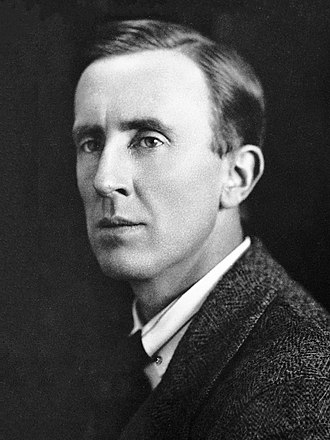- J.R.R. Tolkien was an English writer and professor, best known as the author of “The Lord of the Rings” trilogy.
- He was born on January 3, 1892, in Bloemfontein, South Africa.
- Tolkien served in World War I as a signals officer, an experience that influenced his writing and themes of war in his novels.
- He was a philologist and expert in languages, specializing in Old and Middle English.
- Tolkien worked as a professor at the University of Leeds and later at the University of Oxford.
- He developed his own constructed languages, such as Elvish and Dwarvish, which are featured in his fictional works.
- Tolkien’s love for mythology and folklore heavily influenced his writing, and he drew inspiration from various mythologies, including Norse and Celtic.
- He began writing stories and creating the Middle-earth legendarium at a young age, inspired by his love for fantasy and mythology.
- “The Hobbit,” published in 1937, was Tolkien’s first published novel and introduced readers to the world of Middle-earth.
- “The Lord of the Rings,” published in three volumes between 1954 and 1955, became one of the most popular and influential fantasy series of all time.
- Tolkien’s novels created a rich and detailed fantasy world, with intricate histories, diverse races, and epic battles between good and evil.
- He created memorable and beloved characters such as Frodo Baggins, Gandalf, and Aragorn, who have become icons of fantasy literature.
- Tolkien’s works explore themes of heroism, friendship, the corrupting influence of power, and the importance of preserving nature and the environment.
- The success of “The Lord of the Rings” trilogy led to the rise of the fantasy genre as a popular literary and cultural phenomenon.
- Tolkien’s writing style is known for its vivid descriptions, attention to detail, and lyrical prose.
- He was a close friend and fellow writer of C.S. Lewis, the author of “The Chronicles of Narnia” series.
- Tolkien’s novels have been translated into numerous languages and have sold millions of copies worldwide.
- He also wrote poetry, short stories, and essays, many of which were published posthumously.
- Tolkien’s posthumously published works, edited by his son Christopher Tolkien, expanded the Middle-earth legendarium and provided deeper insights into the world he created.
- He was a devout Catholic and his faith influenced the moral and spiritual themes present in his works.
- Tolkien was a dedicated scholar of Beowulf and produced a groundbreaking translation and commentary on the Old English epic.
- He was known for his love of nature and spent much of his free time exploring the countryside, which inspired the landscapes of Middle-earth.
- Tolkien’s novels have been adapted into successful film trilogies directed by Peter Jackson, bringing Middle-earth to life on the big screen.
- He was a member of the Inklings, an informal literary group that included other notable authors such as C.S. Lewis and Charles Williams.
- Tolkien’s attention to detail extended to the creation of maps, genealogies, and intricate histories that further enriched the world of Middle-earth.
- He drew inspiration from his own life experiences and personal beliefs, infusing his characters and stories with elements of his own journey.
- Tolkien’s works have had a profound impact on popular culture, influencing subsequent fantasy literature, films, and games.
- He was awarded several prestigious honors during his lifetime, including the Order of the British Empire and academic recognition for his contributions to literature.
- Tolkien’s writing process involved a meticulous approach, often revising and rewriting his works extensively before publication.
- He left behind a vast amount of unpublished writings, including unfinished novels and fragments that continue to be studied and explored by scholars.
- Tolkien’s novels have been praised for their depth and authenticity, creating a fully realized world with its own languages, histories, and mythologies.
- He was a beloved and respected professor, known for his engaging lectures and passion for language and literature.
- Tolkien’s impact goes beyond his literary works, with his ideas and philosophies inspiring readers to appreciate the power of storytelling and the importance of imagination.
- He coined the term “eucatastrophe,” describing the sudden turn of events in a story that brings about a joyous or hopeful outcome.
- Tolkien’s writings continue to resonate with readers of all ages, capturing the imagination and transporting them to a world of magic and adventure.
- He believed that myths and fairy tales held profound truths and expressed universal human experiences.
- Tolkien’s love for trees and forests is evident in his works, with the Ents, the ancient tree-like creatures, playing a significant role in “The Lord of the Rings.”
- He was a dedicated family man and had four children with his wife, Edith Tolkien.
- Tolkien’s linguistic expertise led to the creation of numerous languages, dialects, and scripts for the different races in his fictional world.
- He expressed his disdain for allegory, stating that his works were not intended to represent specific historical or political events.
- Tolkien’s works have been studied and analyzed in academic settings, leading to the establishment of Tolkien scholarship as a field of study.
- He had a profound influence on the fantasy genre, inspiring subsequent authors to create their own expansive and immersive worlds.
- Tolkien’s works have been celebrated for their depth of characterization, with morally complex characters and internal struggles.
- He was deeply influenced by his experiences in World War I, particularly the loss of close friends, which shaped the themes of heroism and sacrifice in his works.
- Tolkien’s attention to detail extended to the creation of languages, with Elvish being the most fully developed and widely known of his invented languages.
- He often drew on his own academic research and knowledge of mythology to incorporate elements of folklore and legends into his storytelling.
- Tolkien was a prolific letter writer and corresponded with fans, scholars, and publishers throughout his life.
- His works have been celebrated for their strong female characters, such as Galadriel and Éowyn, who defy traditional gender roles and play significant roles in the narrative.
- Tolkien’s novels have been embraced by readers of all ages, captivating generations with their timeless themes and immersive storytelling.
- He left a lasting legacy as one of the greatest fantasy authors of all time, leaving behind a body of work that continues to inspire and captivate readers around the world.
Facebook Comments


































